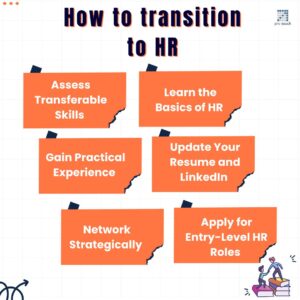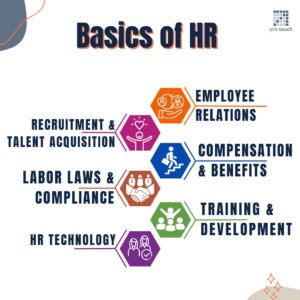Transitioning into a Human Resources (HR) career involves building relevant skills, gaining foundational knowledge, and aligning your current experience with HR responsibilities. Here’s a step-by-step approach:

- Assess Transferable Skills
Before stepping into HR, take stock of the skills you’ve developed in your current and past roles. Many core competencies valued in HR are commonly found in other professions. Here are some key transferable skills to identify:
- Communication: HR requires clear verbal and written communication, whether you’re explaining policies, resolving conflicts, or conducting interviews.
- Problem-Solving: Handling employee issues, navigating compliance, and mediating disputes all demand a solution-oriented mindset.
- Organization: Managing employee records, tracking deadlines, and coordinating recruitment processes require excellent organizational skills.
- Empathy and Interpersonal Skills: HR professionals must build trust, maintain confidentiality, and connect with diverse personalities.
- Analytical Thinking: Analyzing workforce data, identifying trends, and making evidence-based decisions are critical to modern HR functions.
Reflect on how these skills have shown up in your work so far. Document specific examples that demonstrate your capabilities—these will be useful in tailoring your resume and preparing for HR interviews.
- Learn the Basics of HR
Once you have assessed your transferable skills, the next step is to build foundational knowledge in Human Resources. Understanding the core functions and principles of HR will help you speak the language of the field and prepare you for both interviews and real-world tasks.

Key areas to learn include:
- Recruitment & Talent Acquisition: Learn how job descriptions are written, how candidates are sourced, and the basics of interviewing and onboarding.
- Employee Relations: Understand how HR professionals manage conflict, support employee engagement, and foster a positive workplace culture.
- Compensation & Benefits: Gain a basic understanding of how salaries, bonuses, benefits, and rewards are structured and managed.
- Labor Laws & Compliance: Familiarize yourself with employment laws such as FLSA, FMLA, EEO, and others that ensure fair and legal practices.
- Training & Development: Explore how companies support employee growth through workshops, mentorship, and skill-building initiatives.
- HR Technology: Learn about common tools like HRIS (Human Resource Information Systems), payroll software, and applicant tracking systems (ATS).
How to Learn:
- Take online courses (e.g., Human resource management courses, HR certification, HRBP course).
- Read HR blogs, industry publications, and textbooks.
- Join free webinars or attend local HR workshops or networking events.
By mastering the basics, you’ll gain the confidence and knowledge needed to take your first concrete steps into an HR role.
Certifications:
- Human Resource Management Courses
- HR Certification
- HRBP
- Gain Practical Experience
While theory is essential, hands-on experience is what truly prepares you for an HR role—and helps you stand out to employers. Fortunately, there are multiple ways to gain relevant experience even if you’re not officially in an HR position.
Ways to Build Experience:
- Volunteer for HR-related tasks at your current job: Offer to help with recruitment, onboarding, organizing training sessions, or updating employee handbooks.
- Take on HR duties in small businesses or nonprofits: Many smaller organizations welcome help with basic HR functions, especially from someone eager to learn.
- Freelance or contract work: Platforms like Upwork sometimes list entry-level HR support roles, such as resume screening or scheduling interviews.
- Internships: Even if you’re mid-career, short-term HR internships—paid or unpaid—can provide valuable exposure.
- Job shadowing or mentorship: Ask an HR professional if you can observe their work or assist with small projects to understand their daily responsibilities.
Keep a log of your tasks and accomplishments. This helps build a practical portfolio and gives you concrete examples to include on your resume and discuss in interviews.
By actively seeking out opportunities to apply your knowledge, you’ll bridge the gap between learning and doing—making your transition to HR more effective and credible.
- Update Your Resume and LinkedIn
Once you’ve built your HR knowledge and gathered some hands-on experience, it’s time to reflect that progress in your professional profiles. Your resume and LinkedIn should clearly demonstrate your transferable skills, growing HR expertise, and your serious intent to transition into the field.
Resume Tips:
- Tailor your headline and summary: Use phrases like “Aspiring Human Resources Professional” or “Customer Service Specialist Transitioning into HR” to signal your direction.
- Highlight transferable skills: Emphasize communication, problem-solving, and team collaboration, backed by real achievements.
- Show relevant experience: Even if your role wasn’t in HR, showcase HR-like responsibilities—e.g., training team members, resolving conflicts, coordinating hiring efforts.
- Include HR learning and certifications: List any courses, certifications or workshops you’ve completed.
- Quantify results: Where possible, include metrics (e.g., “Assisted in onboarding 10+ new hires over 3 months”).
A well-aligned resume and LinkedIn profile not only show you’re serious about HR—they help recruiters see your potential even if your experience is non-traditional.
- Network Strategically
Breaking into HR is often about who you know just as much as what you know. Building genuine relationships with HR professionals can open doors to job leads, mentorship, and industry insights that aren’t always posted publicly. Join HR groups on LinkedIn or attend SHRM events. Informational interviews with HR professionals can provide insights and referrals.
- Apply for Entry-Level HR Roles
With your skills assessed, HR knowledge gained, resume polished, and network growing, it’s time to start applying for roles that can launch your HR career. Entry-level and hybrid roles are excellent starting points—even if the job title doesn’t explicitly say “HR.”
Start with roles such as:
- HR Coordinator
- HR Assistant
- Talent Acquisition Assistant
- Training Coordinator
Conclusion:
Transitioning into a career in Human Resources is both strategic and rewarding move for professionals from various backgrounds. Whether you are coming from administration, customer service, education, or another field, your transferable skills—such as communication, problem-solving, and organizational abilities—can serve as a solid foundation for HR work. By gaining relevant certifications, networking with HR professionals, learning the fundamentals of employment law and talent management, and applying for entry-level or hybrid roles, you can make a successful shift into the HR field. With persistence and a commitment to learning, a fulfilling career in Human Resources is within reach.





Leave a Reply